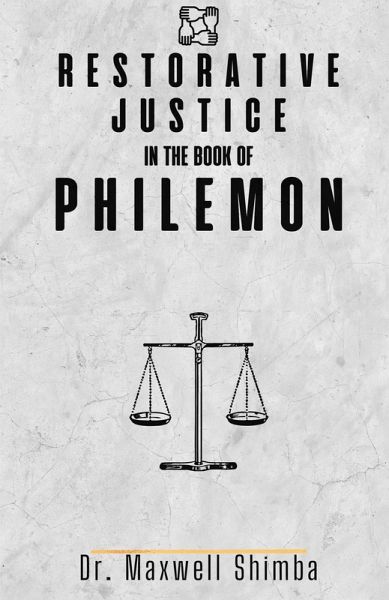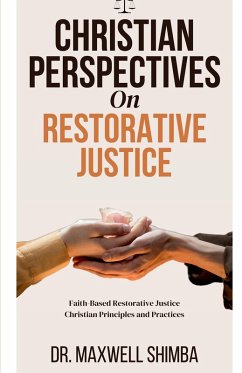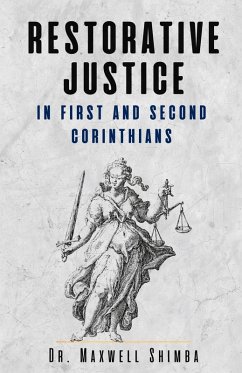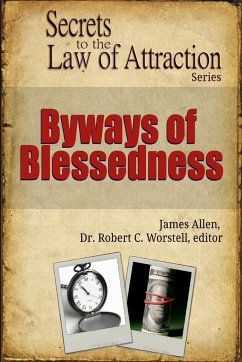
Restorative Justice in the Book of Philemon
Versandkostenfrei!
Versandfertig in 1-2 Wochen
15,99 €
inkl. MwSt.

PAYBACK Punkte
8 °P sammeln!
Restorative Justice in the Book of Philemon Dr. Maxwell Shimba's book, Restorative Justice in the Book of Philemon, provides a comprehensive and insightful examination of the principles of restorative justice as demonstrated in Paul's brief but powerful letter to Philemon. The book delves into the historical and cultural context of the letter, providing readers with a deeper understanding of the dynamics between Philemon, Onesimus, and Paul. By situating the narrative within the broader framework of the Roman Empire's social and legal norms, Dr. Shimba sheds light on the revolutionary nature o...
Restorative Justice in the Book of Philemon Dr. Maxwell Shimba's book, Restorative Justice in the Book of Philemon, provides a comprehensive and insightful examination of the principles of restorative justice as demonstrated in Paul's brief but powerful letter to Philemon. The book delves into the historical and cultural context of the letter, providing readers with a deeper understanding of the dynamics between Philemon, Onesimus, and Paul. By situating the narrative within the broader framework of the Roman Empire's social and legal norms, Dr. Shimba sheds light on the revolutionary nature of Paul's appeal for forgiveness and reconciliation. Central to the book is the exploration of Paul's empathetic and compassionate approach towards Onesimus, a runaway slave who had wronged Philemon. Dr. Shimba highlights how Paul, acting as a mediator, appeals to Philemon's sense of Christian duty and love, urging him to receive Onesimus not as a slave but as a beloved brother in Christ. This radical redefinition of their relationship challenges the entrenched social hierarchies of the time and underscores the transformative power of the gospel. Dr. Shimba meticulously analyzes the letter's structure, noting how Paul begins with commendations, moves to a heartfelt appeal, and concludes with expressions of confidence and personal commitment. This strategic approach, which balances respect, authority, and love, serves as a masterclass in gentle persuasion and effective mediation. Through this analysis, readers gain a deeper appreciation for Paul's rhetorical skills and his deep commitment to the principles of restorative justice. The book also examines the broader implications of Paul's intervention for the early Christian community. By advocating for Onesimus's acceptance as a brother, Paul promotes a vision of the church as an inclusive and egalitarian community. Dr. Shimba argues that this message of unity and mutual support was crucial for the growth and cohesion of the early church, setting a precedent for how conflicts and relationships should be managed within the Christian community. In addition to its historical and theological insights, Restorative Justice in the Book of Philemon offers practical guidance for applying restorative justice principles in contemporary settings. Dr. Shimba provides readers with practical steps for cultivating empathy, facilitating dialogue, making restitution, and fostering reconciliation in their own lives and communities. By bridging the ancient text with modern applications, the book serves as a valuable resource for anyone seeking to promote healing and justice in today's world. The book includes study questions, discussion guides, and additional resources, making it an excellent tool for individual reflection, group study, and community initiatives. These resources encourage readers to engage deeply with the text and to explore ways to integrate restorative justice principles into their personal and communal practices. Dr. Shimba's thoughtful and accessible writing ensures that the book is suitable for a wide audience, from scholars and theologians to laypeople and community leaders. In Restorative Justice in the Book of Philemon, Dr. Maxwell Shimba has crafted a work that is both scholarly and practical, deeply rooted in biblical exegesis and relevant to contemporary discussions on justice and reconciliation. The book stands as a testament to the enduring power of Paul's message and offers a compelling vision for how restorative justice can transform relationships and communities. Through its rich insights and practical applications, this book is sure to inspire and equip readers to pursue justice, healing, and reconciliation in their own contexts.














